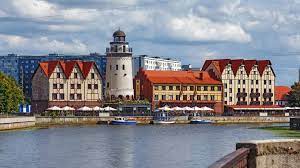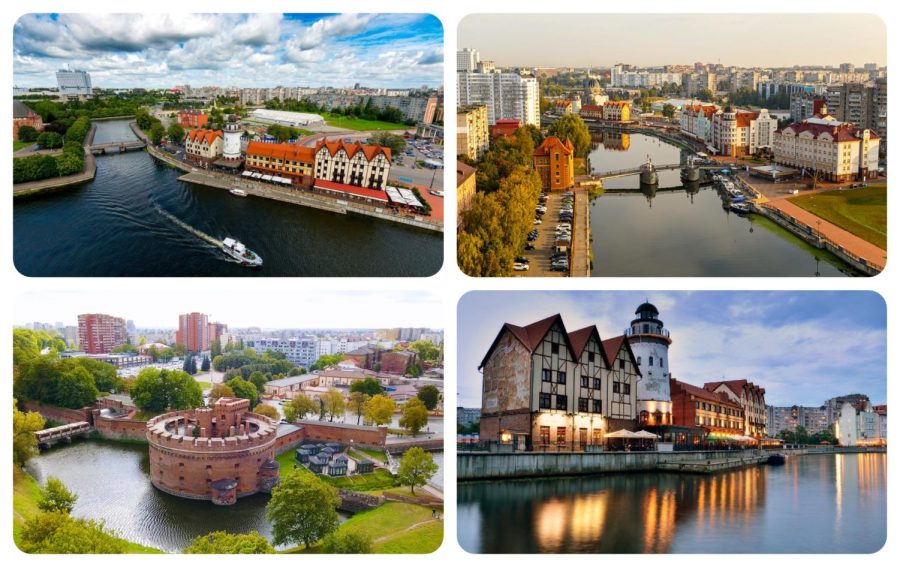This Baltic Exclave Might Be the Newest Country You’ve Never Heard Of

March 2, 2022
Looking at the beautiful cityscapes, it is surprising to think that this is not a popular travel destination. And at first glance, could easily be mistaken for a territory in Germany. There is only one problem…

As seen above, this is a sign stating the name in Russian, and claiming it as a Russian territory. And it is true, even though it is separated by entire countries, this small exclave squished between Poland and Latvia is part of Russia, and it is currently almost completely cut off due to the Russo-Ukraine crisis.

The History of Kaliningrad
You may rightfully wonder why there seems to be so much German influence in a Russian city, and it is an incredibly interesting story.
Starting in 1657, Kaliningrad was a German city that was essential to the operation of the German Empire. At its height there were over 300,000 people, and it became a cultural center for Germany. Many iconic structures were built and it eventually became the administrative center, even depicted on the Brandenburg Gate.

During World War II, the area was extremely damaged by a bombardment of British missiles. This damage made the land almost inhabitable. The final nail in the coffin came once the Soviet Union marched into the territory and claimed it as their own.
After the end of World War II, the Potsdam conference in 1954 determined that the USSR will maintain control of the region for varied reasons. Not only was the region inhabited primarily by Russians, but also no surrounding country had the resources needed to rightfully rejuvenate the area.
Between the years of 1946 and 1949, an agreement between the Allied Forces and the Soviets forced all remaining Germans out of the territory and repopulated it with Soviet citizens. The city was then rebuilt and the official administrative language was changed from German to Russian.
This became an essential part of the Soviet Union, as it was slightly outside of the borders. This position allowed for a point for soldiers to amass and retreat to when invading surrounding territories. The port also became the central place of the Baltic Fleet, and was such a strategic position during the Cold War that all non-military access to the region was ceased.
Even after the collapse of the Soviet Union, Kaliningrad remained essential to the Russians. To this day it remains their only Baltic Sea port, and the only port in Russia that is ice-free all-year round.
The Future of Kaliningrad 
While Kallingrad has remained very important to Russia, after the fall of the Soviet Union, Russia has become less and less important to Kaliningrad. It is now impossible to travel between the rest of Russia and Kaliningrad without stepping foot in NATO or EU territory. The sandwich of alternatively aligned countries has put a strain on the region’s relationship with Russia.
This strained relationship was worsened by the Russo-Ukrainian crisis. Now that the relationship between NATO/EU and Russia has dissolved, Kaliningrad has become cut-off from mainland Russia and essentially stranded.
Recently, Vadim Petrov, a leader of the Baltic Republican Party has notified the Russian government that he plans to initiate a referendum that would allow Kaliningrad to secede from Russia, according to this leader, the majority of the public agrees with this push.
Petrov states that the general public does not agree with the reign of Putin, and then even as he attempts to lengthen his rule, he will not be seen as a legitimate leader after 2024. They also disagree with the militarization of the region, and demand that troops be pulled out of Ukraine, and the Kaliningrad region be demilitarized by at least 50% within two months, or the referendum will begin.
Notably, Petrov also states that they fear the militarization of the region will strain their relationship with neighboring Latvia and Poland, aligning with the Kremlin’s fear that subjects are becoming too closely aligned with the West. They have compared their situation to the Crimea region that is currently occupied by Russia, yet internationally recognized as being Ukrainian. The Kremlin’s justification for occupying the zone is that it followed the will of the people, and Petrov states that this is an example of the same.
Whether Kaliningrad is your next travel destination, or the location for a future coup against Russia, it is a region with a rich history and scenery that further legitimizes Putin’s fear that the West is influencing Slavic countries in an unprecedented way. Is this the beginning of the end for Putin?


